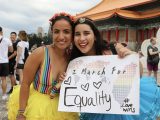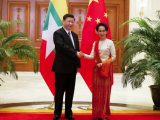20 People Were Arrested When Police Broke up Manila’s Pride Protest
June 29, 2020When Rey Valmores-Salinas left her home on Thursday to celebrate Pride in Manila, she was expecting a peaceful afternoon march to Mendiola, a historic protest site. Masked and clutching a rainbow “Junk Terror Bill” flag, Salinas occasionally stopped to remind her few dozen fellow activists to practice social distancing.
What she didn’t expect was that before reaching their final destination, the protesters would be forcefully confronted by a group of police officers, and that 20, including herself, would be leaving the march in handcuffs.
Police grabbed and dragged protesters from the street or their vehicles into police vans, said Salinas.
Another officer took the key of a van carrying protesters and drove them to a police station. One Twitter video shows police attempting to arrest a Manila Today intern, but he was released after calls to let the media go.
Salinas said that police couldn’t give an answer as to why she and the other marchers were arrested, and Filipino Attorney Jesus Falcis told VICE News that “the arrests were illegal because the police at that time could not cite a ground or law for their arrest.”
Manila police spokesman Lt. Col. Carlo Manuel said that the protesters lacked a permit and defied police orders by fleeing, according to the Associated Press.
Rappler reported that they were charged with disobedience of person in authority in relation to the Republic Act 11332, or the Law on Reporting of Communicable Diseases, as well as Batas Pambansa 880, or the Public Assembly Act. Prior to a previous protest in Manila earlier this month, human rights lawyers had insisted that the government's lockdown measures did not forbid rallies outright.
The protesters said that the unrest began when one officer snatched a protester from behind, while the police claim that it began when one protester allegedly sprayed a liquid at an officer.
Currently, 17 protesters remain in detention, while three minors arrested at the scene were immediately released, Salinas said. The confrontation—much of which was caught on tape—and the continued detention of the LGBTQ demonstrators tests the supposed national atmosphere of acceptance during Pride Month and beyond.
“The arrests made it clear that the government isn't there to protect us LGBTQIA+ people but rather there to take us down,” Tetsu Komatsuzaki, advocacy officer for Pioneer Filipino Transgender Men Movement, told VICE News. “This should be a significant reminder as to why Pride isn't just mere celebration, but rather a protest. Pride has and always will be a protest.”
Komatsuzaki was originally planning to attend the protest, and was stopped only by a last-minute inability to find a means of transport.
“This means that I could've been arrested as well. I am relieved to not be in that position but at the same time I feel for my fellow queer activists,” he said, adding that upon hearing of the arrests he felt “rage, disappointment, fear, and hopelessness.”
Falcis told VICE that while there are few national laws that recognize one’s sexual orientation, gender identity, and gender expression, the Philippines’ LGBTQ community enjoys a measure of freedom of expression because they have fought for it in spite of ridicule, stigma, and discrimination.
“Compared to other ASEAN countries, we have relatively more freedom when it comes to LGBT movements but this shows that state violence cuts across gender issues,” the Iloilo Pride Team told VICE News.
Immah Toledana, president of Benilde Hive, a LGBTQ student organization, echoed the idea that the Philippines outwardly seems accepting, but people still face discrimination for the way they present themselves.
“There are either [of] two ways that you can focus on the effects of this event. This could either be seen as a catalyst for the advocacy to be heard by more people, or it may instill more fear,” Toledana said.
She hopes that this incident informs the public on the issues that the LGBTQ community faces.
Salinas said that even in detention, she experienced discriminatory remarks and mockery.
“Since I was a trans woman, police officers wanted to force me into male quarters. We vehemently resisted, and after heated debate led by our lawyers and my fellow women detainees who fought to have me stay with them, the officer in charge finally budged,” Salinas said.
In a statement, the human rights group Karapatan said that the “arrests are not the first time that the police and other law enforcement officials attacked the LGBTQ+ community under the guise of enforcing lockdown measures.” They cited an April 5 incident in Pampanga where a local official stopped three LGBTQ+ individuals who were out past an 8pm curfew, and ordered them to kiss, dance, and do push-ups on a livestreamed video.


